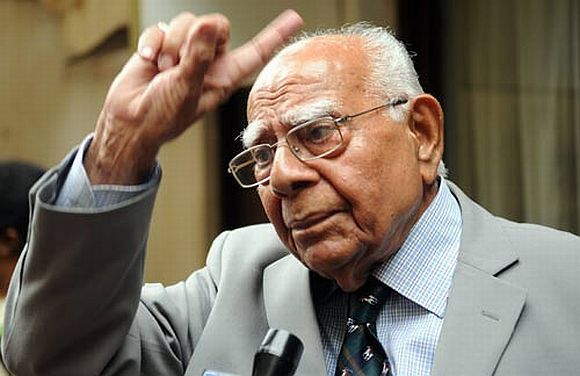
Ram Jethmalani, a doyen of legal profession who bid adieu to the world at the age of 95, leaves behind a rich legacy of his seven-decade-long career when he was in action in scores of sensitive court battles and had earned the reputation of a maverick politician for his bold and sometimes controversial stands.
Jethmalani breathed his last at 7.45 am at his official residence in New Delhi.
He began practising as a lawyer in Pakistan's Karachi in pre-Partition India after obtaining the degree of law from Shahani Law College, Karachi, at the age of 17.
A rebel by nature, he lived the life to the fullest, donning different hats -- lawyer, parliamentarian, minister -- but was not a quintessential politician constrained by party lines.
The advocate successfully petitioned the high court in Karachi for lowering the minimum age for practising to 21 and later set up a law firm in Karachi with his friend and senior, A K Brohi.
He moved to Mumbai in 1948 after the partition and started practising in the commercial capital of the country where he won a legal battle opposing the the Bombay Refugees Act which allowed the State to relocate, sequester and question refugees anytime.
Jethmalani earned the distinction of being the youngest member of the Bar -- and went on to become the oldest member. He was India's one of the highest paid advocates.
Jethmalani opposed the Emergency imposed by the Indira Gandhi government and the clamping of Maintenance of Internal Security Act, a controversial law allowing authorities to arbitrarily arrest those opposing the government decision.
His political career was no less interesting -- he reached parliament from the Janata Party, the BJP, the RJD, served under Atal Bihari Vajpayee and later contested against him, was expelled from the Bharatiya Janata Party and sued the party for that, and at the age of 64, in 1987, announced his candidacy for the post of President.
Jethmalani had the first brush with politics in 1971 when he contested as an Independent candidate from Ulhasnagar in Maharashtra supported both by the Shiv Sena and then-Bharatiya Jan Sangh. He could not win the election though.
The post-emergency years saw Jethmalani being elected from Mumbai as a member of parliament in the 6th (1977) and 7th (1980) Lok Sabha on Janata Party and BJP tickets, respectively.
He did not get the cabinet berth until 1996 when he became Union law minister. In 1998, he served as the the Minister of Urban Development under Vajpayee.
He had to resign from the Cabinet over differences with the then Chief Justice of India Adarsh Sein Anand and Attorney General of India Soli Sorabjee.
In 2004, he contested the general elections against Vajpayee from the Lucknow constituency.
However, in 2010, he came back to the BJP and was elected to Rajya Sabha on its ticket from Rajasthan.
But in 2013, he was expelled from the BJP for six years for 'breach of discipline' for which he filed a suit against the party for expulsion and sought Rs 50 lakh in damages.
The matter was amicably settled after then BJP president Amit Shah expressed 'regret' over the senior lawyer's expulsion from the party.
Jethmalani defended Shah when he was facing a probe in the Sohrabuddin Sheikh encounter case of Gujarat in which he was later discharged.
Jethmalani launched a political front called Bharat Mukti Morcha in 1988 and a political party -- 'Pavitra Hindustan Kazhagam' -- in 1995, with a motto to achieve 'transparency' in Indian Democracy.
While critics described him as 'maverick', rebel and a bold person, they were unanimous he was the best legal brain in the country and handled most sensitive cases especially criminal cases.
Attorney General K K Venugopal remembered his contribution. "He was handling cases across the board and he was a very outspoken person and didn't mince a word against the judiciary."
"His boldness set him apart as one of the finest lawyers that the country has had and his passing away is also a loss to Parliament and to the country as a whole," Venugopal said.
Born in Sikharpur of Sindh province on September 14, 1923, Jethmalani's love for Sindh was manifested when he appeared in the SC and successfully opposed a PIL that demanded removal of the word 'Sindh' from the national anthem.
Jethmalani was married quite early in life after graduating in law. Two of his children pre-deceased him.
He is survived by his son Mahesh Jethmalani, also an eminent senior advocate, and daughter Shobha, who is based in the US but frequently visits India.
His also defended the accused - Kehar Singh and Balbir Singh - in the Indira Gandhi assassination case.
He succeeded in getting acquittal for Balbir Singh and when Singh's son, Rajinder Singh, was sacked from the government job he gave him employment in his office.
The lawyers who worked with Jethmalani described him as a real champion of human rights. In his 75 years career, he took up several cases of illegal detention including that of Sant Longowal during the Punjab militancy in 1980s and accepted to defend people in most sensitive, difficult and controversial cases from across the country.
Besides the Indira Gandhi assassination case, he defended Rajiv Gandhi's killer as well in Madras high court in 2011.
He also defended Delhi university professor SAR Geelani, who was acquitted by the Supreme Court in the 2011 Parliament attack case.
Jethmalani had the distinction of appearance in all spectre of cases -- constitutional matters, difficult criminal cases or commercial offences.











 © 2025
© 2025